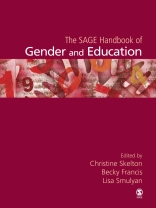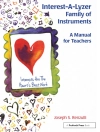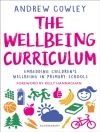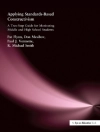The
Handbook of Gender and Education brings together leading scholars on gender and education to provide an up-to-date and broad-ranging guide to the field.
It is a comprehensive overview of different theoretical positions on equity issues in schools. The contributions cover all sectors of education from early years to higher education; curriculum subjects; methodological and theoretical perspectives; and gender identities in education. Each chapter reviews, synthesises and provides a critical interrogation of key contemporary themes in education. This approach ensures that the book will be an indispensable source of reference for a wide range of readers: students, academics and practitioners.
The first section of the Handbook, Gender Theory and Methodology , outlines the various (feminist) perspectives on researching and exploring gender and education. The section critiques the notion of gender as a category in educational research and considers recent trends, evident especially in the gender and underachievement debates, to locate gender difference solely within biology. This section provides the broad background upon which the issues and debates in the other sections can be situated.
Section two, Gender and Education , considers the differing ways in which gender has been shown to impact upon the opportunities and experiences of pupils/students, teachers and other adults in the different sectors of education. It also includes a chapter on single-sex schooling.
Section three, Gender and School Subjects , comprises chapters that cover gender issues within the teaching and learning of particular school subjects (for example, maths, literacy, and science). It also includes topics such as sex education and assessment.
The chapters in section four, Gender, identity and educational sites, address up-to-date issues which have a long history in terms of explorations into gender and educational opportunities. More recent inclusions in the debates, such as disability, sexuality, and masculinities are discussed alongside the more traditional concerns of ′race′, social class and femininities.
The final section, Working in Schools and Colleges , illuminates the working lives of teachers and academics. The chapters cover such topics as school culture, career progression and development, and the gendered identities of professionals within educational institutions.
The contributors to this book have been selected by the editors as authorities in their specific area of gender and education and are drawn from the international scholarly community.
विषयसूची
SECTION ONE: GENDER THEORY AND METHODOLOGY
Introduction
The ′Nature of Gender′ – Becky Francis
Understanding Men: Gender Sociology and the New International Research on Masulinities – R.W. Connell
Femininities: Reclassifying Upward Mobility and the Neo-liberal Subject – Valerie Walkerdine & Jessica Ringrose
Gender, Education and Social Thought – Jo-Anne Dillabough
Gender and Methodology – Catherine Marshall & Michelle Young
Feminist Pedagogy – Gaby Weiner
Gender, Education and Development – Elaine Unterhalter
Gender and Movements in Social Policy – Meg Maguire
SECTION TWO: GENDER AND THE EDUCATIONAL SECTORS
Introduction
Constructing Gender in Early Years Education – Glenda Mac Naughton
Boys and Girls in the Elementary School – Christine Skelton
Masculinities and Femininities and Secondary Schooling – Kevin G. Davison & Blye W. Frank
Gender Equity in Post Secondary Education – Carol Leathwood
Gender and Higher Education – Sara Delamont
Single Sex Education – Diane Leonard
SECTION THREE: GENDER AND SCHOOL SUBJECTS
Introduction
Gender and Mathematics – Jo Boaler & Tesha Sengupta-Irving
Engaging Girls in Science – Angela Calabrese Barton & Nancy Brickhouse
Gender and Literacy – Bronwyn Davies and Sue Saltmarsh
′Sex′ Education – Bagele Chilisa
Gender Issues in Testing and Assessment – Janette Elwood
Gender and Citizenship – Tuula Gordon
Gender and Modern Language Education – Linda von Hoene
Gender and Technology: What the Research Tells Us – Jo Sanders
SECTION FOUR: GENDER, IDENTITY AND EDUCATIONAL SITES
Introduction
Room at the Table: Racial and Gendered Realities in the Schooling of Black Children – Janie Ward & Tracy Robinson Wood
Gender and Class in Education – Diane Reay
The ′Right′ Way to Educate Boys – Wayne Martino
Femininities and Schooling – Carrie Paechter
Sexualities, Schooling and Hetero-Gender – D James Mellor & Debbie Epstein
Achieving Equity: Disability and Gender – Harilyn Rousso & Michael L. Wehmeyer
Gender Voices in the Classroom – Madeleine Arnot
SECTION FIVE: WORKING IN SCHOOLS AND COLLEGES
Introduction
School Culture and Gender – Fengshu Lui
Gendered Classroom Experiences – Emma Renold
Women in Teaching – Jane Gaskell & Ann Mullen
Constructing Teaching Identities – Lisa Smulyan
Women Working in Academe: Approach with Care – Sandra Acker & Michelle Webber
Gender and School Administration – Charol Shakeshaft
लेखक के बारे में
My early research focused on teacher professional development through classroom-based action research. In addition to that applied work, I also do qualitative research which examines the intersection of teachers′ and administrators′ personal and professional lives within particular institutional and social contexts. I am particularly interested in the role that gender plays as a part of the construction of self in students′, teachers′, and administrators′ experiences.
I also explore the advantages and dilemmas inherent in using qualitative research methods, in particular ethnography and life history interviews, as a way of bringing previously unheard voices and frameworks of meaning making into the field.
I am currently moving into an exploration of some of these issues in international contexts. I have examined teacher education and staff development in Indonesia, South Africa, and China and worked directly with teachers in Indonesia to explorethe possibility of more student-centered learning.
Most of my courses are interdisciplinary, drawing on work in the fields of Psychology, Sociology and History. In courses and seminars such as Comparative Education, Adolescence, Gender and Education, and Social and Cultural Perspectives in Education my goal is to help students examine the interactions among individuals, institutions, and social contexts. I am interested in exploring – and having students explore – the role of schools as social institutions that can both contribute to and simultaneously challenge existing social constructs and power relationships.












